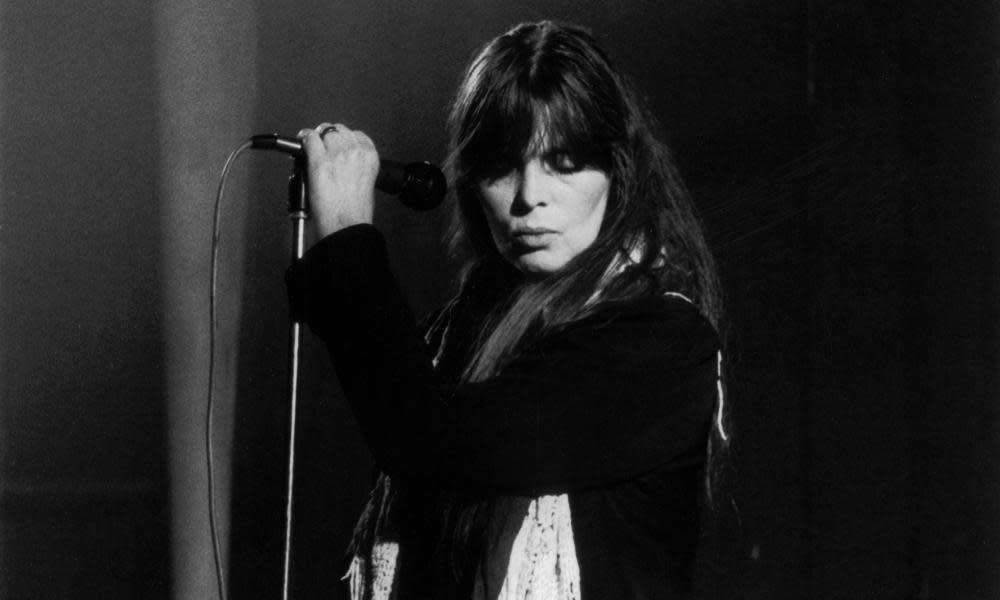You Are Beautiful and You Are Alone review – Nico as the gothic Garbo

The German-born chanteuse and model Christa Päffgen, better known as Nico, starred in Federico Fellini’s 1960 box-office hit La Dolce Vita and, for a while, formed part of the New York pop art experiment the Velvet Underground. With her baritone voice and angular “ice maiden” looks, she acquired the reputation of a gothic Garbo or punk Dietrich, by turns mysterious and aloof. Her discomfiting 1968 solo album The Marble Index is revered for its doom-laden, Germanic atmospherics and dirge-like harmonium playing, which lends a low church intensity and sepulchral tone to her extraordinary voice.
Nico was only 49 when, in 1988, she died after a cerebral haemorrhage brought on by sunstroke caused her to fall off her pushbike. Junked up on opioids for 15 years, it’s a wonder she ever made it to middle age. In this new biography, You Are Beautiful and You Are Alone, Jennifer Otter Bickerdike digs deep into the life of one of the strangest and most unlikely singer-songwriters of our time.
Born in Cologne in 1938 to parents of Spanish and Yugoslavian descent, Nico led a tough life in post-Hitler Germany, where her mother scraped a pittance as a seamstress. Her father, a Wehrmacht recruit, was apparently shot dead by his commanding officer after a French sniper’s bullet had entered his brain. In later years, Nico liked to say that “German pigs” had murdered him.
A difficult quarry for biographers, Nico not only made the wildest nonsense about herself credible, but encouraged others to add to it. She claimed to have been sexually assaulted at the age of 13 by an African American infantry sergeant, but no record of the case exists in the US Army archives, says Bickerdike, so we cannot know for sure.
In 1956, Päffgen took the name “Nico” on the advice of the German fashion photographer Herbert Tobias. She may have had lesbian affairs with the French movie star Jeanne Moreau and the fashion designer-businesswoman Coco Chanel (whose abstract, imperiously powdery Chanel No 5 perfume was a favourite with Nico). Rumours of bisexuality added to her mystique.
A nomadic, restless spirit, she hung out with Ernest Hemingway in Paris in the mid-1950s and was courted by both Leonard Cohen and Bob Dylan (who wrote I’ll Keep it With Mine for her). Disastrously, she fell in love with Alain Delon and gave birth to their son, Christian Aaron Boulogne (whom she called “Ari”), in 1962. Delon, then the most famous screen actor in France, denied paternity even though his resemblance to Ari was irrefutable. (The boy was raised by Delon’s long-suffering parents.)
Bickerdike’s is a gossipy but informative biography. Andy Warhol already knew Nico from La Dolce Vita when he met her in Paris in the spring of 1965. Having mythologised 20th-century America in a handful of defining images (car crashes, race riots, electric chairs), the PR-savvy, headline-hunting pop art impresario saw in Nico an ideal vamp for the Velvet Underground, whom he managed. Nico became amorously involved with the band’s singer-songwriter Lou Reed but grew tired of his diva-like jealousies. “I cannot make love to Jews any more,” she hissed at him. Her casual antisemitism looks mild alongside Nico’s other, more appalling behaviours. In a New York restaurant in 1971 she cut open the face of the young Black Panther singer-activist Emmaretta Marks, after Marks had complained to an adjacent table of racial inequalities. “Suffering!” Nico reportedly yelled at her. “You don’t know what suffering is!” Marks needed 20 stitches but pressed no charges.
No eyewitness agrees on what actually happened but Bickerdike exonerates Nico from charges of racism and attributes the violence to an eruption of long pent-up childhood anxieties. “In Nico’s mind, almost any kind of suffering would have paled by comparison to what she saw and experienced during her early years in Nazi Germany.” Nico’s insecurity was the catalyst for the altercation, then, not the colour of Marks’s skin. (Some may choose to disagree.)
Generally, Bickerdike makes Nico out to be a misunderstood, sphinx-like enigma. Her last years were spent in London and Manchester, where, painfully shy, she clomped about in motorbike boots, played harmonium and subsisted on quantities of lentil soup and methadone (which induced a bovine-like placidity in her). The biography is poorly written, with a surfeit of ill-chosen words (“She was a true bohemian, who deserves proper recognition for her brave, ballsy, often weird and always deeply personal albums…”). You Are Beautiful and You Are Alone, the third life of Nico to date, nevertheless grimly absorbs from start to finish.
• You Are Beautiful and You Are Alone: The Biography of Nico by Jennifer Otter Bickerdike is published by Faber Music (£20). To support the Guardian and Observer order your copy at guardianbookshop.com. Delivery charges may apply


